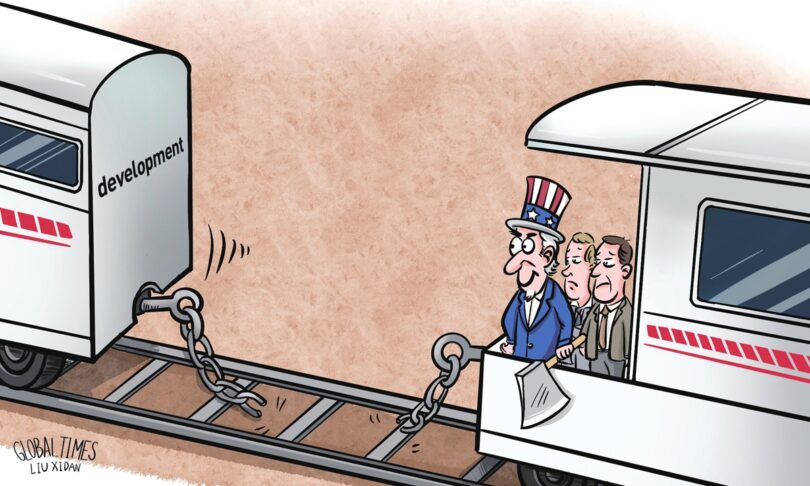Sun Xihui
With China’s sustained development, the country’s comprehensive national strength and international influence continue to ramp up, while Washington’s sense of strategic anxiety has also waxed. Overall, the Joe Biden administration has continued its predecessor’s negative perception and strategy toward China, identifying China as “America’s most consequential geopolitical challenge” and suppressing China mainly in the fields of security, economy and technology.
The Biden administration’s technology policy toward China is similar to that of Trump’s team, but with different specific tactics. Biden’s team focuses more on semiconductors and chips, abiding by the idea of a “small yard, high fence” to promote “technological decoupling” from China and intensify internal and external linkages. By spreading anxiety and piling on political and security pressure, Washington is forcing allies and partners to remain the same stance with the US, restricting the export of high-end chips to China through technology export controls and long-arm jurisdiction.
In this vein, the Biden administration signed a range of bills and executive orders related to semiconductors and chips, and established the Semiconductors in America Coalition, a cross-sector alliance of companies that make and use semiconductors, as well as the Chip 4 Alliance and try to further expand its membership, and prohibit the US and its allies and partners from providing high-end chips to Chinese companies.
However, the US technological blockade against China has not produced the desired effect. Chinese high-tech companies such as Huawei have not gone bankrupt. Instead, China’s high-end chip research and development has constantly made breakthroughs, and technological progress in various fields has rapidly advanced.
US “technical decoupling” from China essentially aims to work as a preventive blockade or sanction. In theory, at least three conditions must be met for such policies to be successful. One is that the country trying to block another has absolute technological superiority and capabilities. Another is that the country targeted by the blockade lacks the ability to independently develop such technologies. Furthermore, the country being targeted by the embargo cannot obtain such technical resources from other countries. In reality, Washington has not fully met these three conditions.
First, the US has solid semiconductor and chip technology strength, but it is not an “all-round champion” or has absolute technological advantages. In this context, the US cannot blockade China on its own in the field of technology.
Second, China has an enormous talent pool, considerable investment in research and development, as well as a strong capacity for independent innovation. That is to say that China has the capability and conditions to realize independent scientific and technological innovation in any field. Third, there are interest differences between the US and its allies as well as its partners, and their science and technology policies toward China are contradictory and counterproductive.
In terms of science and technology policies toward China, Washington hopes to solidify its allies and partners to try to limit China’s technological progress and strength growth through the “chip embargo.” Most of the US’ allies and partners tend to follow suit at the instigation and pressure of the Washington, but do not want to harm the economic interests of their own companies, and are reluctant to completely deteriorate their relations with China. Since China is an important consumer and importer of high-end chips, restricting the export of high-end chips to China will impair the interests of the companies from the US, as well as its allies and partners.
Furthermore, in order to secure its own superiority in the semiconductor sector, the US requires the chip companies of its allies and partners to invest and produce in the United States. For example, Taiwan Semiconductor Manufacturing Company in 2020 committed at least $12 billion to build its first facility in Arizona, and in November 2022, the chip giant said it planned to bring its most advanced technology in Arizona.
The “oppressive” cooperation of the US with its allies and partners has led to the accumulation of dissatisfaction among the latter. The US government restricts the export of high-end chips to China on the grounds of national security, which not only damages the interests of the US’ domestic companies, but also strengthens China’s determination to take the path of independent innovation.
In short, although the US policy of restricting the export of high-end chips to China has triggered Chinese companies to face losses and difficulties for a certain period of time, it cannot stop China’s technological progress. As related companies of the US and its allies and partners have suffered huge losses as a result, Washington cannot form a consistent policy toward China with these countries. The US’ capability to restrict technology and its influence on China will also be further weakened.







